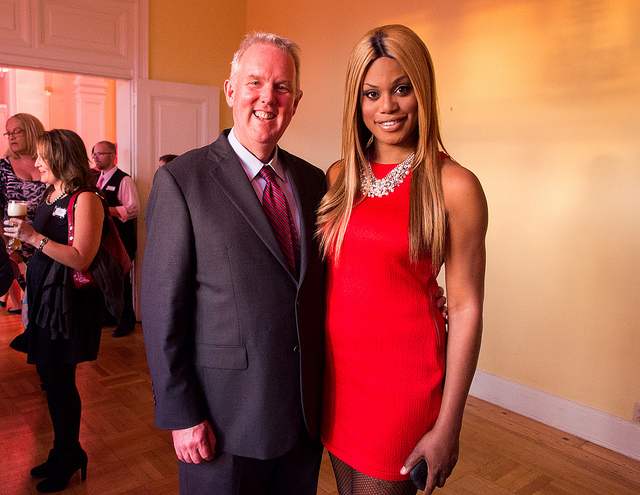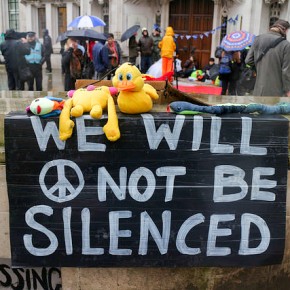Earlier this month, American magazine Allure released a nude photoshoot featuring Orange is the New Black star Laverne Cox. Bloggers like Meghan Murphy of Feminist Frequency shot back, criticizing the alleged “empowerment” of the shoot. Murphy writes polemically, asking “What the fuck are you trying to sell us, America?” before condemning Cox and Allure for having done “everything in their power to create and present a ‘perfect’ female body, offered up to the male gaze for consumption, but sold as ‘radical’ and emblematic of ‘self-love.'”
It would be easy to dismiss Murphy as ‘transphobic’ and leave it at that. Personally, I don’t know how someone can claim to value female empowerment in the same article that she reduces trans women who surgically transition to people who “spend thousands and thousands of dollars sculpting their bodies in order to look like some cartoonish version of “woman.” It is absurd to define yourself as a feminist and then write a piece this antagonistic to women undergoing an extremely difficult process in which they often have few allies.
At the same time, the increased visibility of trans women like Cox and Carmen Carrera in professions like acting and modeling does raise a number of important questions. They are simply obfuscated in Murphy’s insistence on being offensively polemical. Trans women frequently use the term TERF (“Trans-exclusionary Radical Feminist”) to describe feminists like Murphy, who are disproportionally concerned with establishing concrete boundaries on the category of “Woman” at the expense of other issues. Take the larger block of that male gaze quote:
“The Cut, for example, spoke with Cox about the shoot, who admitted she *gasp* ate mac ‘n’ cheese the night before.
The day before we had done the Essence Black Women in Hollywood luncheon with a bunch of the ladies from Orange Is the New Black. So that night we went out to dinner,” Cox said. “I was like, I want to have mac ’n’ cheese. I know I have a nude photo shoot tomorrow, but I want to have mac ’n’ cheese tonight. I don’t like to talk too much about this, but I was my biggest weight during that photo shoot, and so I was like, Gotta love yourself. You got to embrace all of this.
This was deemed “radical self-acceptance” by The Cut. Ok, so we are to believe that, 1) Achieving a “perfect” body, as defined by a patriarchal/porn culture, through plastic surgery, then presenting it as a sexualized object for public consumption equates to “radical self-acceptance”? 2) Eating food is “radical?”

I agree that The Cut has a bizarre definition of “radical self-acceptance.” Eating food before a photoshoot doesn’t strike me as particularly liberating. To be fair though, Murphy overlooks Cox’s background when she patronizingly rejects her for being proud that she ate mac ‘n’ cheese before the shoot. Cox was a black woman from Mobile, Alabama eating mac ‘n’ cheese before doing a nude spread in a Manhattan-based monthly dominated by white models. It may not be especially radical, but Cox was bragging about rebuking racial and class-based standards of how a model is supposed to behave. That is fair, even if it isn’t changing the world.
The reason Murphy ignores it is because she simply didn’t consider that Cox’s decisions could be separated from “patriarchal/porn culture” itself. We have to oppose this fusion, and remember it during the growth of trans women modeling, acting, and working in highly sexualized forms of pop culture. Women like Cox and Carrera aren’t simply chasing a market-driven ideal of beauty through plastic surgery. Even by implying that, Murphy reveals just how little she respects trans femininity. Take this quote:
Is it really a sign that we “love everything about ourselves” (which, for the record, I hardly expect anyone to do. Women, especially, are taught to hate their bodies and work to alter them to suit the expectations of a misogynist society. Trans people have received the message that, if they don’t properly fit into the limiting and oppressive gender binary, there is something wrong with them that can only be resolved by embracing the opposite end of the gender spectrum) if we alter our bodies through surgery and hormones? It seems clear that “radical self-acceptance” is not at all what Cox is experiencing or conveying to her audience.
There are two problems here. The first is her characterization of transitioning, which she dismisses as “embracing the opposite end of the gender spectrum” as a result of not “properly fit[ting] into the limiting and oppressive gender binary.” Not all trans women do embrace surgery and hormones like Cox. Rather, some trans women ultimately make the decision because they feel as though it is the best possible expression of their gender and sexuality. Others transition in different ways, and don’t feel the need to get surgery. Murphy characterizes transgenderism as a vain celebration of market-driven ideals, rather than a radically subjective decision about personal sexuality. This is extremely dangerous, since it further excludes women who are already severely alienated.
The second is that Murphy is making a logical mistake in assigning culpability when it comes to the magazine industry. She blames both Cox and Allure equally for a situation which she previously characterized as “creat[ing] and present[ing] a ‘perfect’ female body, offered up to the male gaze for consumption, but sold as ‘radical’ and emblematic of ‘self-love.'” The fact is that while eating mac ‘n’ cheese may not be a radical act of self-love, going through an extremely difficult process to fully express your sexuality, and accepting the backlash that accompanies it, deserves to be recognized as radical. The problem is that magazines like Allure have begun to commodify that power, and channel it into an industry that promotes certain aesthetics as the foundations of Western sexual imagery.
Should Cox be to blame for that? Should trans women more broadly? The answer is no. Trans women like Cox are simply expressing their gender and sexuality on their terms, which in some cases, align with conventional definitions of beauty. The magazines come later, when Allure editors realize that they can be seen as edgy for photographing a model that is surgically “perfect,” and shares many bodily features with the models they would have photographed anyway. There are important debates to be had about the wider consequences of that dynamic. I’m not exactly thrilled that transgendered women get used in a relentless promotion of “ideal femininity.” But they’re not subsections of patriarchy, and Cox certainly doesn’t deserve the treatment that Murphy gives her.
We need to be analytically precise about the problem. It is with a market-driven system of patriarchy that appropriates women attempting to express their genders and sexuality, and spins them as goddesses because they have “the right look.” Trans women get sucked into that dynamic along with everyone else. That doesn’t mean that they are adding strength to the patriarchal system, through constructs like the gender binary. Rather, it means that they are being affected by a nexus of social relations that shapes how the world interacts with their decisions about sexual expression. Avoiding that reality strikes me as a self-inflicted form of “divide and conquer,” which is especially sinister if you consider that if you change some words around, Murphy’s rant can also be used against cisgendered sex workers. These polemics rarely begin and end with their explicitly targeted populations.
Photographs courtesy of Tommy Wells and Believe Out Loud. Published under a Creative Commons License.





